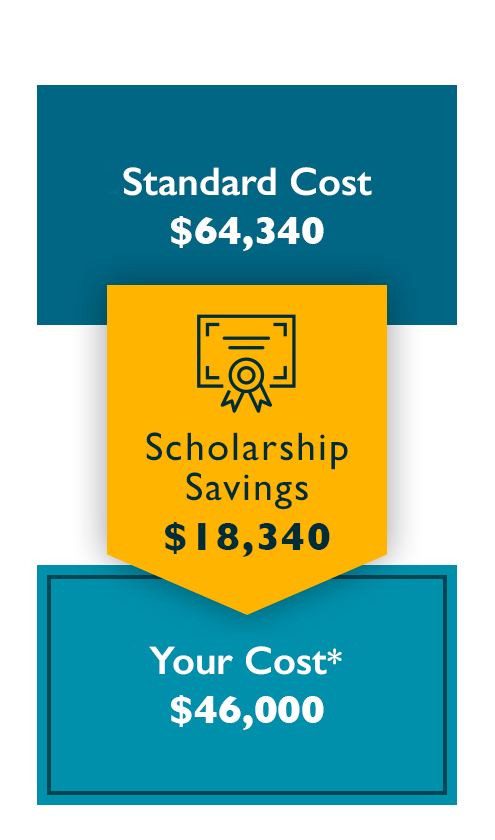Why Choose Walden?
Accelerate Into Master’s (AIM)
Earn up to 25 master’s-level credit hours by taking graduate-level courses as an undergraduate. This allows you to complete both degrees in less time than earning each degree separately. Learn more about Accelerate Into Master’s (AIM).
Curriculum
Degree Completion Requirements
-
181 quarter credits (course-based learning) / 180 quarter credits (Tempo Learning®)
(1 semester credit equals 1.5 quarter credits)-
General education courses (46 cr.)
-
Core courses (55 cr.)
-
Elective courses (75 cr.)
-
Capstone course (5 cr.)
-
Students may be eligible to transfer up to 135 credits*. At least 45 credits must be completed at Walden.
*Please note: Students that reside in Virginia may be eligible to transfer up to 125 credits. At least 55 credits must be completed at Walden.
View the COMPLETE CURRICULUM PLAN.
Time to completion will vary by student, depending on individual progress and credits transferred, if applicable. For a personalized estimate of the number of your transfer credits that Walden would accept, call an Enrollment Specialist at 844-767-9522.
Degree Completion Requirements
-
181 quarter credits (1 semester credit equals 1.5 quarter credits)
-
General education courses (46 cr.)
-
Core courses (55 cr.)
-
Concentration courses (25 cr.)
-
Elective courses (50 cr.)
-
Capstone course (5 cr.)
-
Students may be eligible to transfer up to 135 credits*. At least 45 credits must be completed at Walden.
*Please note: Students that reside in Virginia may be eligible to transfer up to 125 credits. At least 55 credits must be completed at Walden.
View the COMPLETE CURRICULUM PLAN.
Time to completion will vary by student, depending on individual progress and credits transferred, if applicable. For a personalized estimate of the number of your transfer credits that Walden would accept, call an Enrollment Specialist at 844-775-4075.
Walden Undergraduate Academy®
Discover a new bachelor’s education experience for first-time adult college students.
Walden Undergraduate Academy opens new doors for working adults like you and makes earning a degree more achievable than ever before. This dedicated learning experience has an extra layer of support to help you build your confidence and academic skills before you start your online bachelor’s program.
Admission Requirements
Admission is considered for adult students who hold a high school diploma or its equivalent. Applicants must also meet one of the following criteria:
- You are 21 years of age or older.
- You are less than 21 years of age with at least 12 quarter credits.
- You are an active member of the military or a veteran with documentation of service.
More information for international applicants.
| Curriculum Component | Requirements | Cost | Amount |
|---|---|---|---|
| Tuition | 181 quarter credit hours | $340 per quarter hour | $61,540 |
| Program Fee | Per quarter | $175 | $2,800 |
| $64,340** | |||
| BELIEVE & ACHIEVE SCHOLARSHIP YOUR TUITION | -$18,340 $46,000* | ||
*Represents course-based learning format, minimum time to completion, no transfer of credit, and Believe & Achieve Scholarship. Your actual total program time and costs may vary. Believe & Achieve Scholarship savings based on current tuition. See Scholarship Details for more information.
**Tuition reflects the minimum time to completion. Time to completion varies by student, depending on individual progress and credits transferred, if applicable. Tuition and time to complete may be reduced if transfer credits are accepted, or if you receive grants, scholarships or other tuition reductions. Walden may accept up to 135 transfer credits. For a personalized estimate of the number of your transfer credits that Walden would accept, call an Enrollment Specialist at 844-768-0109.
Tuition and fees are subject to change. Books and materials are not included and may cost up to an additional $5,000.
Progress at Your Pace. Control Your Cost.
Walden’s Tempo Learning® programs follow a subscription-based pricing format. Students are billed a flat-rate for each 3-month subscription term. All pricing is represented in U.S. dollars and is subject to change.
| Program | Subscription Period Tuition | Subscription Period PROGRAM Fee | Subscription Period Time Frame |
|---|---|---|---|
| BS in Health Studies | $2,650 | $175 | 3-month subscription period |
| You may be able to complete your BS in Health Studies degree in 20 months for under $18,000.* | |||
*Represents Tempo Learning® format, Believe & Achieve Scholarship, and the fastest pace of our top 25% transfer students in this program in the Tempo Learning® format. Your actual total program time and costs will depend on your individual pace and transfer credits. A student’s pace is usually determined by their experience, ability to work independently, and availability. Believe & Achieve Scholarship savings based on current tuition. See Scholarship Details for more information.
Financial Aid
Financial aid is available for this program. Our financial aid advisors can help you identify funding opportunities to help you pay for your education.
With Tempo Learning, you may be able to complete your BS in Health Studies degree in as few as 20 months for as low as $15,000.*
*Represents Tempo Learning® format, Believe & Achieve Scholarship, and the fastest pace of our top 25% transfer students in this program in the Tempo Learning® format. Your actual total program time and costs may vary. Tuition and fees are subject to change. See Tuition and Fees section and Scholarship Details for more information.
Program Outcomes
Turn Your Passion Into Impact
Walden’s Bachelor of Science in Health Studies program empowers you with the knowledge and skills to help others shape a healthier future. A BS in Health Studies degree prepares students for increasing responsibility in nonclinical careers in fields ranging from public health to health education. Apply what you learn immediately to make a greater impact in your current job—or take the next step in your career.
What’s the Career Impact of Earning a BS in Health Studies?
Find Your Opportunity in a Thriving Field
As the population ages, the demand for healthcare services is greater than ever. Healthcare jobs are predicted to surge 18% through 2026, faster than the average for all occupations. In fact, this industry is expected to create more jobs than any other occupational group—approximately 2.4 million.2
Be a Health Change Agent
Walden’s BS in Health Studies program can prepare you for roles in a range of settings. Career options include:
-
Health promoter/health advisor
-
Community health worker
-
Worksite wellness coordinator
-
Teacher/coach
-
Lifestyle coach
-
Pharmaceutical/medical salesperson
Potential settings in which you could work with a health studies degree include:
-
City, state, or national government health programs
-
Community health programs
-
Health and wellness facilities
-
Health-based foundations
-
Hospitals and clinics
-
Medical diagnostic laboratories
-
Nursing and residential care facilities
-
Recreation and therapeutic facilities
Career options may require additional experience, training, or other factors beyond the successful completion of this degree program.
Learning Outcomes
Graduates of this health studies degree program will be prepared to:
-
Evaluate health and wellness promotion initiatives.
-
Critically appraise the context and quality of healthcare delivery within and outside of the United States.
-
Evaluate health-related research and research methods.
-
Explain how a variety of factors (including behavioral theories, social and cultural factors and epidemiological principles) impact health.
-
Assess public and global health issues across class, race, ethnicity, and culture.
-
Demonstrate the skills needed to create effective health programs and services (inclusive of program planning, healthcare management, and program evaluation).
-
Demonstrate effective communication skills necessary to advance social change in health education and promotion.
Testimonials
I chose Walden University because many of my colleagues were alumni. They highly recommended Walden for the working professional who seeks outstanding professor engagement throughout all courses.
Related Articles
FAQ About Walden’s Online BS in Health Studies
In a BS in Health Studies program, you’ll take classes focused on the policies, organization, financing, and dynamics of the U.S. healthcare system. You can even choose from concentrations such as healthcare management, health promotion and wellness, and health psychology and behavior. The program can help you learn how to:
- Evaluate health and wellness promotion initiatives.
- Critically appraise the context and quality of healthcare delivery within and outside of the United States.
- Evaluate health-related research and research methods.
- Explain how a variety of factors (including behavioral theories, social and cultural factors, and epidemiological principles) impact health.
- Assess public and global health issues across class, race, ethnicity, and culture.
- Demonstrate the skills needed to create effective health programs and services (inclusive of program planning, healthcare management, and program evaluation).
- Demonstrate effective communication skills necessary to advance social change in health education and promotion.
A bachelor’s in health studies can provide you with a broad base of healthcare knowledge. This means it can academically prepare you for a wide range of healthcare careers. With a BS in Health Studies, you can gain the skills and knowledge you need to pursue opportunities in settings such as:
- Ambulatory healthcare services
- Health practitioners’ offices
- Hospitals and clinics
- Medical diagnostic laboratories
- Nursing and residential care facilities
- Outpatient care centers
- Nonprofit organizations
Deciding which degree program best fits with your passions and career goals is the first step in earning your degree. A BS in Health Studies is a common choice among health professionals, along with a BS in Healthcare Management or a BS in Public Health. Here is an overview of each:
BS in Health Studies
When you pursue a bachelor’s in health studies, you can gain a greater understanding of the policies, organization, and dynamics of the U.S. healthcare system. In this program, you can learn how to turn your passion for improving quality of life for individuals, families, and communities into action that impacts the field and effects social change. Ultimately, a high-quality BS in Health Studies program can equip you with the knowledge and tools to shape a healthier future for others and empower you to create the health behavior changes you want to see.
BS in Healthcare Management
Earning your BS in Healthcare Management positions you to be part of a thriving industry. In this program, you can master the business side of the U.S. healthcare system and the management techniques that guide the operation of healthcare organizations. You will also explore the latest trends and mission-critical challenges affecting healthcare, including health insurance, healthcare finance, and reimbursement. And with an aging population and ever-changing healthcare laws and regulations, the Bureau of Labor Statistics projects the demand for qualified medical and health services managers to rise 32% by 2030—a positive employment outlook for those who earn their bachelor’s in healthcare management.
BS in Public Health
When you enroll in a BS in Public Health program—like the one at Walden University—you can explore a curriculum featuring case studies on the latest public health issues and the challenges impacting population health and healthcare systems today. Whether you want to evaluate health-related research and research methods or analyze social, political, and economic issues that impact public health and healthcare delivery systems within and outside of the U.S., earning a bachelor’s in public health can give you the tools to help transform the quality of health and well-being in your community.
Aligning with the National Commission for Health Education Credentialing (NCHEC) responsibilities and competencies, Walden’s BS in Health Studies program is continuously refined to meet the needs of our diverse student population and the ever-changing landscape of the health industry. The program offers a number of concentrations, including one that academically prepares you to sit for the Certified Health Education Specialist (CHES) exam. You can also choose a learning modality: traditional course-based learning or a self-paced competency-based format. And with the course-based Accelerate Into Master’s (AIM) option, you can earn credits toward your master’s degree as you earn your bachelor’s.
Walden University offers its BS in Health Studies program in two learning modalities: course-based and the competency-based Tempo Learning®.
Course-Based: This is a traditional format for those who prefer an instructor-led approach and learning on a predetermined schedule. This format is best for students who could benefit from additional support, prefer structure, and work well with deadlines.
Tempo Learning®: A competency-based approach that lets working professionals learn and advance at a pace that fits their busy schedule. This format is best for self-directed learners who work well independently and prefer to move through coursework at their own pace.
1Source: Bureau of Labor Statistics, Occupational Outlook Handbook, Healthcare Occupations. National long-term projections may not reflect local and/or short-term economic or job conditions, do not guarantee actual job growth, and are subject to change.
Note on Certification:
The BS in Health Studies program with the Health Promotion and Wellness concentration has been designed to reflect the Seven Areas of Responsibility for Health Educators outlined by the National Commission for Health Education Credentialing (NCHEC) to prepare students to sit for the national Certified Health Education Specialist (CHES) exam. Walden enrollment specialists can provide information relating to national certification exams; however, it remains the individual’s responsibility to understand, evaluate, and comply with all requirements relating to national certification exams for the state in which he or she intends to practice. Walden makes no representations or guarantee that completion of Walden coursework or programs will permit an individual to obtain national certification. For more information about the CHES exam, students should visit www.nchec.org.











